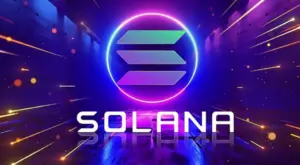What is Solana? (SOL)
Solana is a blockchain platform known for its exceptional performance, designed to offer speedy and cost-effective transactions for decentralized applications (DApps). It utilizes a distinctive consensus algorithm called “Proof of Stake Time” (PoST) to achieve high transaction throughput and minimal latency. The platform’s native cryptocurrency, SOL, serves as the means to pay for transaction fees and actively participate in the platform’s governance.”
Who Created Solana (SOL)?
The Solana blockchain was developed under the leadership of Anatoly Yakovenko, a computer scientist and entrepreneur with extensive expertise in distributed systems and blockchain technology. Anatoly serves as the CEO of Solana Labs, the company responsible for the creation of the Solana blockchain. The team comprises skilled developers, researchers, and advisors who bring a wealth of experience from diverse backgrounds, including finance, cryptography, and software development. Together, they have worked on numerous blockchain projects, contributing to the collective knowledge and innovation in the field.

Anatoly Yakovenko
How Does Solana Work?
Solana employs a distinctive consensus algorithm known as “Proof of Stake Time” (PoST), which delivers exceptional transaction throughput and low latency. Validators are selected based on the amount of SOL they have staked and the duration of their staking commitment. This ensures that validators have a vested interest in the network’s success, as their stake can be reduced if they engage in malicious activities.
The Solana network relies on a group of validators who leverage a parallel processing method called “Tower BFT” to establish consensus on the blockchain’s state. This enables Solana to achieve remarkable transaction throughput, with the current capacity to handle up to 65,000 transactions per second.
To facilitate the storage of vast amounts of data in a decentralized manner, Solana incorporates a decentralized file storage system called “Filecoin.” This feature allows for the efficient storage of extensive data types, including video and audio files, without congesting the network.
Developers benefit from Solana’s programming language called “Solidity,” which enables the creation of smart contracts and decentralized applications (dApps). These dApps can seamlessly interact with the Solana blockchain, capitalizing on its high transaction throughput and low latency.
Moreover, Solana utilizes a native token named SOL, which serves as the medium for paying transaction fees and engaging in platform governance. Users can participate in token-weighted voting to influence network-related proposals and decisions.
Solana Network Architecture
The Solana network architecture consists of several interconnected components that synergistically contribute to a high-performance blockchain platform. Key components include:
Validators: These nodes run the Solana software, actively participate in the consensus process, validate transactions, ensure network security, and collectively agree on the blockchain’s state.
Proof of Stake Time (PoST) consensus algorithm: This unique algorithm selects validators based on the amount of SOL they have staked and the duration of their staking commitment. By combining proof of stake and time, PoST facilitates consensus and validator selection.
Tower BFT: This form of parallel processing enables Solana validators to achieve remarkable transaction throughput and low latency. Tower BFT plays a pivotal role in reaching consensus on the blockchain’s state.
Filecoin: Solana incorporates a decentralized file storage system called Filecoin, which enables the distributed and decentralized storage of extensive data. This feature ensures efficient and scalable data storage, including files such as videos and audio.
Solidity: Solana provides developers with the Solidity programming language, enabling them to write smart contracts and build decentralized applications (dApps) on the Solana blockchain. This empowers developers to leverage the platform’s high transaction throughput and low latency.
Token-weighted voting: Solana implements a system of token-weighted voting, allowing users to participate in network governance. The weight of a user’s vote is determined by the amount of SOL they hold, ensuring a fair and inclusive decision-making process.
Gateway: Solana’s gateway facilitates the connection of external networks, including Ethereum and Bitcoin, promoting interoperability and expanding the platform’s reach.
These components work harmoniously to deliver a fast, cost-effective, and secure blockchain platform capable of processing substantial amounts of data and transactions.
Why Does SOL Coin Have Value?
Utility: SOL is utilized for paying transaction fees on the Solana network. As the network experiences increased usage, the demand for SOL rises, potentially enhancing its value.
Scarcity: Similar to many cryptocurrencies, the total supply of SOL is limited. Consequently, as demand for the coin grows, the value of each individual SOL coin can increase.
Governance: SOL holders have the opportunity to participate in the governance of the Solana network by voting on proposals that impact the network’s development. This grants SOL holders a voice in shaping the network, potentially augmenting the value of their investment.
Liquidity: SOL is listed on various cryptocurrency exchanges, ensuring ease of buying and selling, which enhances its liquidity. This accessibility contributes to the overall value proposition of SOL.
Adoption and Usage: As the number of decentralized applications (dApps) built on the Solana platform increases, and more users adopt the network, the demand for SOL rises. This increased adoption and usage can positively influence the value of SOL.
It is important to note that the value of SOL, like other cryptocurrencies, is highly speculative and volatile. The value of SOL can fluctuate significantly due to market dynamics and external factors.
Where to buy Sol?
SOL can be purchased on several cryptocurrency exchanges, including some of the most popular ones:
Binance: One of the world’s largest and most popular cryptocurrency exchanges, Binance supports SOL trading against various cryptocurrencies such as BTC, ETH, and Binance Coin (BNB).
Huobi Global: Based in Singapore, Huobi Global is a cryptocurrency exchange that enables SOL trading against different cryptocurrencies like BTC, ETH, and Huobi Token (HT).
BitMax: BitMax is a digital asset trading platform that supports SOL trading against a range of other cryptocurrencies, including BTC, ETH, and BitMax Token (BTMX).
OKEx: A Malta-based cryptocurrency exchange, OKEx facilitates SOL trading against several other cryptocurrencies like BTC, ETH, and OKB.
KuCoin: Operating from Singapore, KuCoin is a cryptocurrency exchange where SOL can be traded against various cryptocurrencies, including BTC, ETH, and KuCoin Token (KCS).
It’s important to note that different exchanges may offer different trading pairs and SOL trading volumes. Therefore, it’s crucial to check the available pairs and trading volume before depositing funds and engaging in trading activities.
Furthermore, conducting thorough research is essential when selecting an exchange to buy SOL. Factors such as security measures, fees, and user-friendliness should be considered to ensure a suitable and reliable trading experience.
Remember to stay updated on the latest information as the cryptocurrency market evolves, and always verify the details on the official websites of the exchanges before making any transactions.



